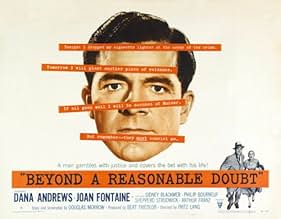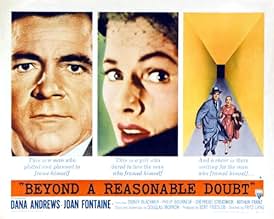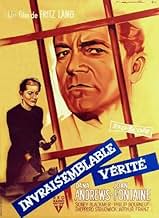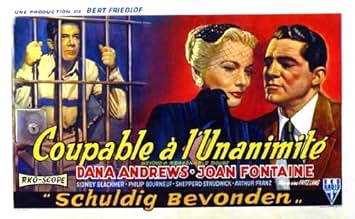IMDb RATING
6.9/10
6.3K
YOUR RATING
A novelist aided by his future father-in-law conspires to frame himself for the murder of a burlesque dancer as part of an effort to ban capital punishment.A novelist aided by his future father-in-law conspires to frame himself for the murder of a burlesque dancer as part of an effort to ban capital punishment.A novelist aided by his future father-in-law conspires to frame himself for the murder of a burlesque dancer as part of an effort to ban capital punishment.
- Awards
- 1 nomination total
William F. Leicester
- Charlie Miller
- (as William Lester)
- Director
- Writer
- All cast & crew
- Production, box office & more at IMDbPro
Featured reviews
Sometimes, in the world of 1940s-1950s film noir, we are given a film so transparently impossible and contrived that we can see ourselves giving up on watching it half way through. But is extremely rare that we are faced with a film where the very response the viewer is having holds the key to the success, rather than the failure, of the film.
Such is the case with BEYOND A REASONABLE DOUBT, which has - to its credit - been completely misunderstood by many. When we reach the film's conclusion, we realize that even the title of the film itself is a joke, perhaps the ultimate prank on the viewer. Yet to offer analysis of the film would be to destroy its main and most sinister motive; you can't "explain away" the glaring plot holes and contrivances without revealing the twist the film takes in its climax, and to do would rob the viewer of a genuine experience. So... I won't.
Suffice it to say, BEYOND A REASONABLE DOUBT is far more than it seems and is nothing without the sum of its parts, in total. Lang tackles the story of a person who creates a fictitious role for himself in order to, essentially, pull a fast one on the legal profession for personal gain (or, as it appears on the surface, someone else's). In the world of film noir, of course, we know that such a character won't get away with it, but when Lang depicts the tragedy the viewer knows will come, he majestically turns the entire premise on its head. As a result, it's a cold slap in the face - a devastating critique of the complicity of the audience in following along, hungrily, with such contrivances in cinema.
Every part of the film fits perfectly by not fitting at all. Even the visual style of the film is a cold, rarely pleasing one, almost daring you to suspend your disbelief just a little bit longer without even granting the pleasure of emotionally charged close-ups at key moments. The editing is brutal and jarring, cutting away practically mid-sentence and moving to a similar conversation elsewhere.
As a swan song to his Hollywood career, BEYOND A REASONABLE DOUBT does to the audience what Billy Wilder does to the industry in SUNSET BLVD. - biting the hand that feeds. The result is a total masterpiece.
Such is the case with BEYOND A REASONABLE DOUBT, which has - to its credit - been completely misunderstood by many. When we reach the film's conclusion, we realize that even the title of the film itself is a joke, perhaps the ultimate prank on the viewer. Yet to offer analysis of the film would be to destroy its main and most sinister motive; you can't "explain away" the glaring plot holes and contrivances without revealing the twist the film takes in its climax, and to do would rob the viewer of a genuine experience. So... I won't.
Suffice it to say, BEYOND A REASONABLE DOUBT is far more than it seems and is nothing without the sum of its parts, in total. Lang tackles the story of a person who creates a fictitious role for himself in order to, essentially, pull a fast one on the legal profession for personal gain (or, as it appears on the surface, someone else's). In the world of film noir, of course, we know that such a character won't get away with it, but when Lang depicts the tragedy the viewer knows will come, he majestically turns the entire premise on its head. As a result, it's a cold slap in the face - a devastating critique of the complicity of the audience in following along, hungrily, with such contrivances in cinema.
Every part of the film fits perfectly by not fitting at all. Even the visual style of the film is a cold, rarely pleasing one, almost daring you to suspend your disbelief just a little bit longer without even granting the pleasure of emotionally charged close-ups at key moments. The editing is brutal and jarring, cutting away practically mid-sentence and moving to a similar conversation elsewhere.
As a swan song to his Hollywood career, BEYOND A REASONABLE DOUBT does to the audience what Billy Wilder does to the industry in SUNSET BLVD. - biting the hand that feeds. The result is a total masterpiece.
Fritz Lang's twenty years as a Hollywood refugee, which had started so spiritedly with "Fury", gradually wound down to the grey, listless offering that is "Beyond a Reasonable Doubt". True, Lang's first and last titles have family resemblances. "Fury" concerns a man who may or may not have committed a capital crime but who deserves due process rather than lynching; "Doubt" is about a guy who frames himself to prove that the irrevocable sentence of capital punishment, legal or not, is never justifiable if the law is fallible.
But whereas the argument of "Fury" was driven full steam ahead by a master of montage ("Metropolis") and suspenseful pacing ("M"), "Doubt" consists largely of two- or three-shots of men in suits with "display kerchiefs", arguing in paneled offices with unraised voices. The story has its due ration of twists as Dana Andrews's writer is persuaded by his prospective father-in-law, a crusading press magnate, to set himself up as a burlesque dancer's killer; the two of them will keep records of the plot that are sure to exonerate Andrews before he faces the chair. (Wouldn't he get a stiff sentence for wasting the cops' time, though?)
But the focus shifts awkwardly from Andrews to his girl and lawyer as it unwinds, and the scenario is oddly bare of dramatic crises. For example, the press boss's death occurs off screen and his exoneration is brought in by his lawyer, not tracked down by his daughter, Andrews's fiancée. Only a few backstage scenes with the dancing girls, all peroxide and nasal cynicism, enliven proceedings. Andrews had begun to freeze into the stone faced stolidity which hampered his later career, while 39 year old Fontaine (the classic aging actress's age) is matronly in costume, maquillage and demeanor: encased in stately prissiness like other English ladies of Hollywood such as Garson and Kerr.
Apart from Fontaine the production looks as well as feels impoverished, aesthetically like Ida Lupino's and Collier Young's problem pics but without their punch. The final twist is not signaled strongly enough to give smarter audience members a decent chance of foreseeing it. At one ludicrous moment, the publisher suggests his guests catch up on the day's highlights in Andrews's murder trial: he turns on a TV which immediately and obligingly recounts them, like George Burns's magic set on "The Burns and Allen Show". Incidentally, was covering trials and commenting on them normal for American television c. 1955?
"Beyond a Reasonable Doubt" was a swansong not only for Lang but for RKO. It had abandoned production three years earlier after being wrecked by Howard Hughes, had sold its studio to Desi and Lucy and was now reduced to releasing outside product: in this instance from one Bert Friedlob. It really was time for Herr Lang to catch the plane back to de-Nazified Germany.
But whereas the argument of "Fury" was driven full steam ahead by a master of montage ("Metropolis") and suspenseful pacing ("M"), "Doubt" consists largely of two- or three-shots of men in suits with "display kerchiefs", arguing in paneled offices with unraised voices. The story has its due ration of twists as Dana Andrews's writer is persuaded by his prospective father-in-law, a crusading press magnate, to set himself up as a burlesque dancer's killer; the two of them will keep records of the plot that are sure to exonerate Andrews before he faces the chair. (Wouldn't he get a stiff sentence for wasting the cops' time, though?)
But the focus shifts awkwardly from Andrews to his girl and lawyer as it unwinds, and the scenario is oddly bare of dramatic crises. For example, the press boss's death occurs off screen and his exoneration is brought in by his lawyer, not tracked down by his daughter, Andrews's fiancée. Only a few backstage scenes with the dancing girls, all peroxide and nasal cynicism, enliven proceedings. Andrews had begun to freeze into the stone faced stolidity which hampered his later career, while 39 year old Fontaine (the classic aging actress's age) is matronly in costume, maquillage and demeanor: encased in stately prissiness like other English ladies of Hollywood such as Garson and Kerr.
Apart from Fontaine the production looks as well as feels impoverished, aesthetically like Ida Lupino's and Collier Young's problem pics but without their punch. The final twist is not signaled strongly enough to give smarter audience members a decent chance of foreseeing it. At one ludicrous moment, the publisher suggests his guests catch up on the day's highlights in Andrews's murder trial: he turns on a TV which immediately and obligingly recounts them, like George Burns's magic set on "The Burns and Allen Show". Incidentally, was covering trials and commenting on them normal for American television c. 1955?
"Beyond a Reasonable Doubt" was a swansong not only for Lang but for RKO. It had abandoned production three years earlier after being wrecked by Howard Hughes, had sold its studio to Desi and Lucy and was now reduced to releasing outside product: in this instance from one Bert Friedlob. It really was time for Herr Lang to catch the plane back to de-Nazified Germany.
This film features Dana Andrews as Tom Garrett, a novelist who is facing a deadline by his publisher to complete his next book. His future father-in-law, Austin Spencer, works has an editor for the big newspaper in town. Spencer has enough clout as an editor that he's regularly in touch with the District Attorney and local law enforcement. Spencer is also anti-capital punishment and is often at odds with the DA, who is very much pro-capital punishment. Spencer feels that the DA feels no qualms about sentencing people to death, because he wants to be seen as the man who makes someone pay for whatever crime he's prosecuting--regardless of whether he presents hard evidence or circumstantial.
An execution is presented at the beginning of the film. Through conversations between Garrett and Spencer and later, Garrett, Spencer and the DA, we learn that the DA has been thought of as taking the most inconsequential circumstantial evidence and manipulating it in court to make it seem like hard fact. Spencer feels like the DA often is grasping at straws, but because he wants to be seen as bringing justice to crimes, he is willing to manipulate any jury into a conviction. Spencer questions the DA about letting a potentially innocent man take the fall based on circumstantial evidence and not actual fact. The DA seems nonchalant about the whole thing.
For his book, Spencer suggests to Garrett that he write a book about someone who is convicted of a crime based on circumstantial evidence. 1) It will give Garrett something to write about, and 2) Spencer will hopefully be able to prove his point to the DA that innocent men could be convicted and executed based on circumstantial evidence. The plan is that Garrett and Spencer will find a crime where the police have no leads. They will then plant evidence in order to focus the police attention on Garrett as the possible perpetrator and implicate him in a crime. They're hoping that Garrett will be arrested and brought to trial. Along the way, Spencer and Garrett plan on taking photos of Garrett planting the evidence so that the photos can be presented to the court in the event that Garrett is convicted of the crime.
You just know from the get-go that something is going to go wrong. Otherwise, where's the suspense? What I did not expect was the ending of the film. What a great twist.
Joan Fontaine is rather wasted in her thankless role as Susan Spencer, Andrews' fiancee and daughter of Austin Spencer. Her finest moment in the film is towards the end, but even then, I think many other actresses could have handled the part--it wouldn't have required an Oscar winner.
An execution is presented at the beginning of the film. Through conversations between Garrett and Spencer and later, Garrett, Spencer and the DA, we learn that the DA has been thought of as taking the most inconsequential circumstantial evidence and manipulating it in court to make it seem like hard fact. Spencer feels like the DA often is grasping at straws, but because he wants to be seen as bringing justice to crimes, he is willing to manipulate any jury into a conviction. Spencer questions the DA about letting a potentially innocent man take the fall based on circumstantial evidence and not actual fact. The DA seems nonchalant about the whole thing.
For his book, Spencer suggests to Garrett that he write a book about someone who is convicted of a crime based on circumstantial evidence. 1) It will give Garrett something to write about, and 2) Spencer will hopefully be able to prove his point to the DA that innocent men could be convicted and executed based on circumstantial evidence. The plan is that Garrett and Spencer will find a crime where the police have no leads. They will then plant evidence in order to focus the police attention on Garrett as the possible perpetrator and implicate him in a crime. They're hoping that Garrett will be arrested and brought to trial. Along the way, Spencer and Garrett plan on taking photos of Garrett planting the evidence so that the photos can be presented to the court in the event that Garrett is convicted of the crime.
You just know from the get-go that something is going to go wrong. Otherwise, where's the suspense? What I did not expect was the ending of the film. What a great twist.
Joan Fontaine is rather wasted in her thankless role as Susan Spencer, Andrews' fiancee and daughter of Austin Spencer. Her finest moment in the film is towards the end, but even then, I think many other actresses could have handled the part--it wouldn't have required an Oscar winner.
While Sidney Blackmer and Dana Andrews cook up and carry out their scheme to prove that an innocent person can be convicted of a murder, everyone ignores the fact that, by getting this innocent person convicted, they're helping the real murderer escape justice. Just sayin'.
For his final Hollywood film, Fritz Lang decided to expose the pitfalls of capital punishment for circumstantial evidence. For this film, Lang has kept it simple; with the entire movie focusing on the central premise and not a lot of anything else going on. Filmmakers can sometimes saturate a film with lots of sub-plots, and it can have a huge detrimental effect on what the film is trying to achieve. By keeping it simple, Lang gives himself time to fully explore the implications of his plot and the film is made more compelling because of this. The story follows Austin Spencer; a person of stature that is continually campaigning against circumstantial evidence being used as a means to send someone to the electric chair. His efforts are unsuccessful, until he has the bright idea to have a man sent to death row on circumstantial evidence, only to be pardoned at the last minute by means of the evidence to prove his innocence being brought to light. Enter Tom Garrett; Austin's son in law to be, and the man that agrees to frame himself for murder...
This is perhaps Lang's best assault on the American justice system; he has created a story that is interesting and very plausible and it works a treat in that it gets you thinking about the fact that with this kind of law; someone really could be killed for something they didn't do. Of course, the chances of someone risking being put to death to expose this are unlikely, but then again; it's only a movie, so you can expect to suspend your belief a little for a point to be made. Beyond a Reasonable Doubt also features one of the most finely tuned plot twists that I've seen in a movie. Lang shows us everything about the plot; from the first ideas, to the setting up, all the way to the trial and because of this; the final twist comes as a complete surprise. It's been done and done a million times since this film, but despite this; Beyond a Reasonable Doubt still has the power to shock the viewer.
Beyond a Reasonable Doubt is one of the highlights of Lang's illustrious filmography. It has an unfairly low IMDb rating, and I hope that you will not use that as a means of deciding whether or not to see this film. It is efficient story telling at it's best and this is one of the highlights of the film noir era.
This is perhaps Lang's best assault on the American justice system; he has created a story that is interesting and very plausible and it works a treat in that it gets you thinking about the fact that with this kind of law; someone really could be killed for something they didn't do. Of course, the chances of someone risking being put to death to expose this are unlikely, but then again; it's only a movie, so you can expect to suspend your belief a little for a point to be made. Beyond a Reasonable Doubt also features one of the most finely tuned plot twists that I've seen in a movie. Lang shows us everything about the plot; from the first ideas, to the setting up, all the way to the trial and because of this; the final twist comes as a complete surprise. It's been done and done a million times since this film, but despite this; Beyond a Reasonable Doubt still has the power to shock the viewer.
Beyond a Reasonable Doubt is one of the highlights of Lang's illustrious filmography. It has an unfairly low IMDb rating, and I hope that you will not use that as a means of deciding whether or not to see this film. It is efficient story telling at it's best and this is one of the highlights of the film noir era.
Did you know
- TriviaFinal American film made by Fritz Lang before returning to Germany. It was a box-office failure.
- GoofsWHile the trial is shown on TV there is a frontal shot of Tom sitting at the defendants desk. This would not be possible as the television camera was stationed behind and to the side of the desk. It's not feasible that the large 1950's era television camera would have been moved to the front of the courtroom for the shot.
- Quotes
Tom Garrett: Well, could I get in touch with you?
Dolly Moore: You've touched enough already!
- ConnectionsFeatured in Private Property (1960)
- SoundtracksBeyond A Reasonable Doubt
Sung by The Hi-Los (as The Hi-Lo's)
Music by Herschel Burke Gilbert
Lyrics by Alfred Perry
- How long is Beyond a Reasonable Doubt?Powered by Alexa
Details
- Release date
- Country of origin
- Language
- Also known as
- Más allá de la duda
- Filming locations
- Chicago, Illinois, USA(location shooting)
- Production company
- See more company credits at IMDbPro
- Runtime
- 1h 20m(80 min)
- Color
Contribute to this page
Suggest an edit or add missing content











































